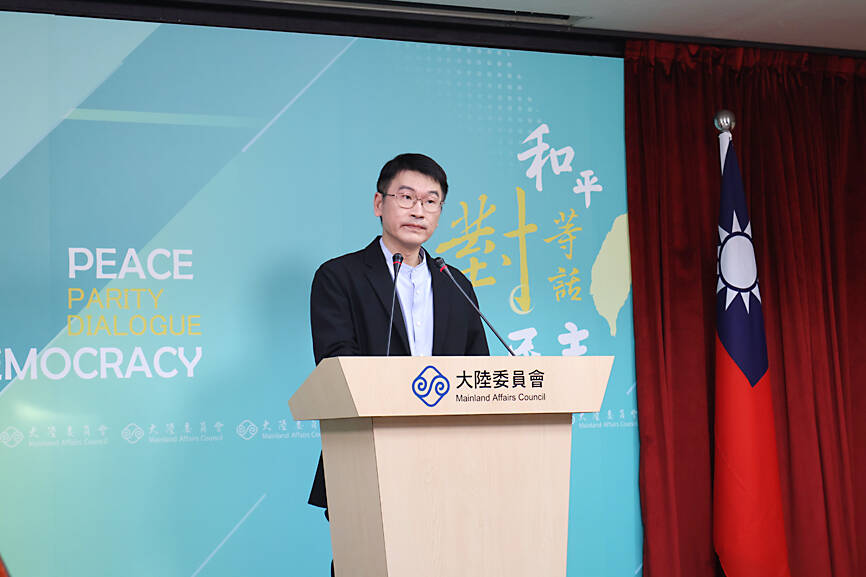The Taipei City Government has not yet submitted a list of Chinese officials who are to attend the Taipei-Shanghai Twin City Forum in Taipei this year for review, the Mainland Affairs Council (MAC) said at a news conference in Taipei yesterday, adding that those with a record of human rights abuses or religious persecution would not be allowed to enter the country.
The annual event is to take place in the middle of next month.
“So far, the Taipei City Government has yet to officially file an application” for Chinese officials who are to attend, MAC Deputy Minister and spokesman Liang Wen-chieh (梁文傑) told reporters.

Photo: CNA
“We do not know which official is to lead the delegation and neither does the Taipei City Government. We have no way to start the review now,” he said.
Chinese officials who have records of human rights abuses and oppressing religious groups would not be allowed to enter the country, he added.
Last year, the council denied entry to a former Chinese National Religious Affairs Administration official with a record of persecuting members of Falun Gong, he said.
Asked about expected Chinese military exercises using President William Lai’s (賴清德) state visit to South Pacific allies as a pretext, Liang said the council would take that factor into consideration.
Good cross-strait exchanges are only possible if they proceed with goodwill, he said.
“The state visit is extremely normal to us, but China has different thoughts. We will closely monitor Chinese government responses to this matter,” Liang said.
About the group of Chinese students and young people who arrived in Taiwan on Wednesday at the invitation of the Ma Ying-jeou Foundation, Liang reiterated the council’s position that young people from China should be allowed to visit Taiwan freely.
However, the delegation might get a limited understanding of Taiwanese culture and society during such a short trip, Liang said.
“It is our belief that they would have a genuine experience of Taiwan if they are allowed to freely interact with Taiwanese students without any political conditions,” he said.
Beijing has suspended its policy of allowing Chinese students to study in Taiwan since April 2020, even though Taiwan showed goodwill last year by extending National Health Insurance coverage to include Chinese students, Liang said.
“We still urge the Chinese government to allow young people to study in Taiwan of their own will. They should be allowed to experience what it is really like to live in Taiwan. Student exchanges should be genuine without being part of ‘united front’ work,” he said.
Students in the group were apparently carefully selected by Beijing, Liang said.
Under normal circumstances, students should come from all kinds of backgrounds, he added.
A normal situation would be that the students can freely study in any country they see fit without restrictions from the government, such as Taiwanese students studying in China, Liang said.

Taiwan is stepping up plans to create self-sufficient supply chains for combat drones and increase foreign orders from the US to counter China’s numerical superiority, a defense official said on Saturday. Commenting on condition of anonymity, the official said the nation’s armed forces are in agreement with US Admiral Samuel Paparo’s assessment that Taiwan’s military must be prepared to turn the nation’s waters into a “hellscape” for the Chinese People’s Liberation Army (PLA). Paparo, the commander of the US Indo-Pacific Command, reiterated the concept during a Congressional hearing in Washington on Wednesday. He first coined the term in a security conference last

Prosecutors today declined to say who was questioned regarding alleged forgery on petitions to recall Democratic Progressive Party (DPP) legislators, after Chinese-language media earlier reported that members of the Chinese Nationalist Party (KMT) Youth League were brought in for questioning. The Ministry of Justice Investigation Bureau confirmed that two people had been questioned, but did not disclose any further information about the ongoing investigation. KMT Youth League members Lee Hsiao-liang (李孝亮) and Liu Szu-yin (劉思吟) — who are leading the effort to recall DPP caucus chief executive Rosalia Wu (吳思瑤) and Legislator Wu Pei-yi (吳沛憶) — both posted on Facebook saying: “I

Sung Chien-liang (宋建樑), who led efforts to recall Democratic Progressive Party (DPP) Legislator Lee Kun-cheng (李坤城), was released on bail of NT$80,000 today amid outcry over his decision to wear a Nazi armband to questioning the night before. Sung arrived at the New Taipei District Prosecutors’ Office for questioning in a recall petition forgery case last night wearing a red armband bearing a swastika, carrying a copy of Adolf Hitler’s Mein Kampf and giving a Nazi salute. Sung left the building at 1:15am without the armband and covering the book with his coat. Lee said today that this is a serious

A mountain blaze that broke out yesterday morning in Yangmingshan National Park was put out after five hours, following multi agency efforts involving dozens of fire trucks and helicopter water drops. The fire might have been sparked by an air quality sensor operated by the National Center for High-Performance Computing, one of the national-level laboratories under the National Applied Research Laboratories, Yangmingshan National Park Headquarters said. The Taipei City Fire Department said the fire, which broke out at about 11am yesterday near the mountainous Xiaoyoukeng (小油坑) Recreation Area was extinguished at 4:32pm. It had initially dispatched 72 personnel in four command vehicles, 16